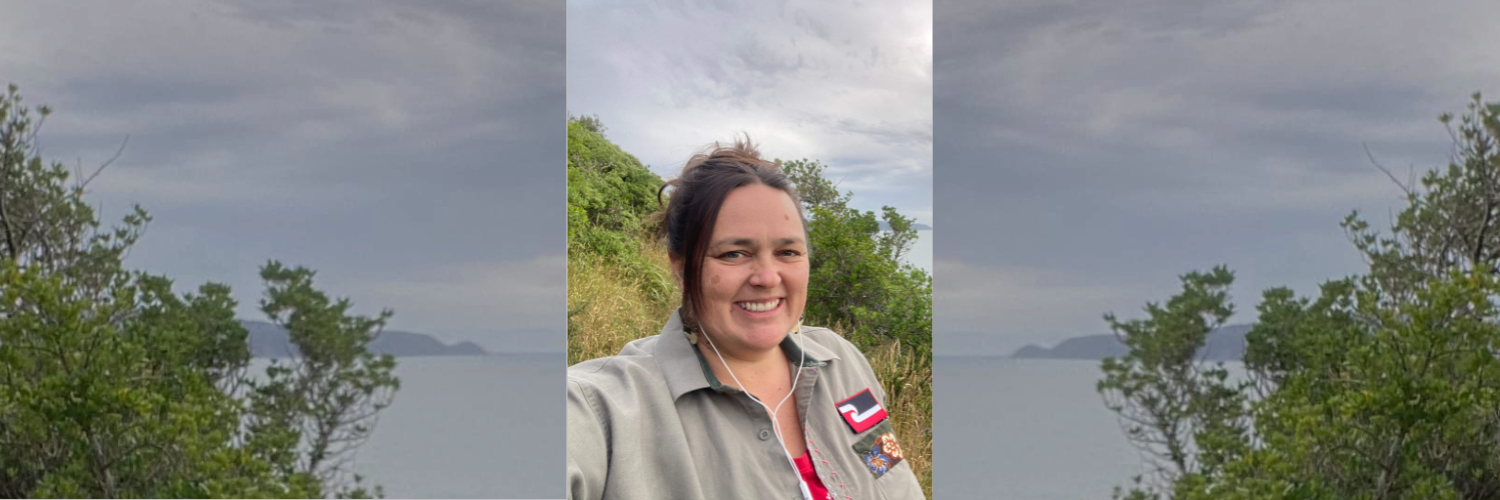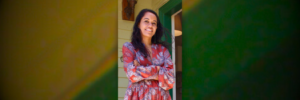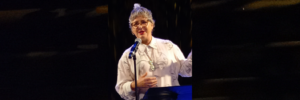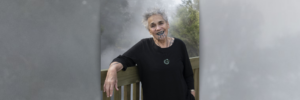
Alice Te Punga Somerville (Te Āti Awa, Taranaki) is a scholar, acclaimed writer, poet and irredentist. She is a Professor in the Department of English Language & Literatures and the Institute for Critical Indigenous Studies at the University of British Columbia (Canada). Alice studied at the University of Auckland, earned a PhD at Cornell University, is a Fulbright scholar and Marsden recipient. Her monograph Once Were Pacific: Maori Connections to Oceania (Minnesota) won Best First Book 2012 from the Native American & Indigenous Studies Association. Alice researches and teaches Māori, Pacific and Indigenous texts in order to centre Indigenous expansiveness and de-centre colonialism. She is the author of Two Hundred and Fifty Ways to Start an Essay about Captain Cook. In 2022, AUP published her first long-awaited collection of poetry, Always Italicise: How to write while colonised. She is the only wahine Māori and second Māori ever, after Hone Tuwhare, to win the Award for Poetry at the Ockham New Zealand Book Awards.
Congratulations on the launch of your first poetry collection, Always Italicise: How to write while colonised. Your poetry is in so many iconic anthologies and your fans have been waiting patiently for years hoping you’d publish a full collection. Why was now the right time for this pukapuka?
I have also been waiting patiently for this book (or a book) to appear. I did have a draft collection about a decade ago (gosh that makes me feel ancient!) that I sent around a few presses and competitions, with no luck and pretty average feedback, then life and other priorities got in the way. I was also really aware through my ‘day job’ as a Māori literary scholar that so few books by Māori poets get to publication through the usual presses (mainstream or Māori) so I was both happy to be in great company (with the others who had also been told no how many times, many of whom have full drafts of collections I would adore to see in the world) and mindful of how big a job it could be to get published. I think in a decade, the world and publishers and readers and all of it has moved on a bit… or is that ‘is starting to catch up’? In 2020 things sharpened for me as we all (and I personally) experienced more acutely the insidious effects of racism, so I was like dammit I am going to rework the collection around that stuff. And here we are.
What do you think your mokopuna will think of this book? What will their reactions be?
I hope they will experience it as a book that helps explain some of the many ways that some of the ‘in between’ generations continued to struggle for, and with, being Indigenous in a colonial context. They may understand some of the failings and shame that I accept may sadly still leak down the generations, although I also hope they read some of these poems and realise that this stuff is in their collective past but isn’t any longer theirs to relive or to fix. They will find family stories, and names, and threads, in the book; I wonder what they will think of the dedication to Titilia, my daughter, who for them won’t be a small child. But I also hope they will see all the aroha and strength that I also hope the book honours.
Your writing has appeared in various publications, and you have authored two other books. What was it like to hold this book, your first poetry collection, in your hands for the first time? Does it feel different to when you published your other pukapuka?
It felt like a relief that it was out in the world, and also – well, when it’s poetry it feels very personal. The others books I’ve written were also personal (especially 250 ways) but there is something about poetry that feels like your heart is on your sleeve – the skeletons are out of the cupboard – you’re standing there in the rain thinking okay I just gave people access to parts of me that could have stayed private.
Te reo Māori reclamation is a key feature in this pukapuka, which highlights feelings of anger, mamae and sadness. Do you have a process to whakanoa after working on poems that can be taumaha?
Honestly I think the writing of poetry is a part of my process, rather than being the thing that requires or necessitates a process. Not all poems see the light of day! Some poems are way too risky, or too strong, or admit too much… I’m a big feelings person, and find it hard to step away or switch things off, and poetry becomes my opportunity to process, connect, calm down, find a way to speak clearly about the things that feel so dangerously murky, find a way to speak on something about which I have felt silenced. It’s life that can be taumaha and the poems become part of how I respond to that.
Readers will experience a full landscape of emotions when reading this book. Despite the trauma of colonisation there is humour here too. Do you spend much time working on consciously balancing this?
I crack terrible cheesy jokes quite a bit – I do it a lot in teaching and my other writing too. I think one way we use humour is to balance, or to reconnect, or to create a bit of space – you see it all the time in Māori contexts – someone cracking a joke to shift or lighten or affirm the mood. So I don’t plan ahead for humour or have a quota system for jokes at the level of poems, while I’m writing, but yes when I was putting the collection together it felt right to note that there had to be shifts and gaps for the light to come in.
Life as a scholar has taken you around the world. How does it feel when writing about Māori experiences when you’re away from home and does this change your writing process at all?
Hmm – sometimes I find things are more clear from a distance. Sometimes I write to feel connected. I have written quite a bit of poetry as a way of thinking and feeling my way through engagements with the local Indigenous communities wherever I am – many of these are not for public sharing! Some of them might be tho.
What are your dreams for this book?
I remember when Karlo Mila’s first collection came out, which I was stoked to teach that first year I was at Vic back in 2005, she said in an interview that she hoped some people would pick up her book and say hey that’s my stuff – that’s me. I get that. So, yes I do hope there are some people who haven’t found themselves – or certain parts of themselves – on pages who find parts of themselves on these pages. Maybe most of those people will be Māori, although I have heard from some other Indigenous readers who have found they connected with some of it too. I hope the book adequately honours the people who I acknowledge in the final section. But, I have to say that I also hope to nudge some people. I hope the book will be a kind of evidence or articulation of how important it is to talk about racism and the ongoing effects and forms of colonialism, including how those effects are internalised by ourselves and weaponised against us.
A big part of your mahi as a professor is highlighting, analysing and celebrating Pacific and Indigenous literature with your students. For many of your students it’s the first time they are introduced to these works. What advice do you have for other English literature educators to improve this?
Ugh I have so many thoughts about this. How on earth is it possible that this is the first time they’re introduced to these works? Educators working in the area of English literature need to find ways to champion and centre Māori, Pacific and Indigenous educators, creative texts and literary scholarship. If you’re a Māori educator, that involves looking after yourself and connecting with the next ones coming through. If you’re a non-Māori educator, that involves learning when to step up and when to step aside. It must involve the transfer of resources: power, positions, the space for texts on the curriculum. I have been really challenged by a recent article about Black Feminism and the calls for engagement with Black Feminist scholarship which, when not accompanied by radical institutional change, can actually just end up being a form of appropriation where the same people are now teaching the new stuff and the ‘new’ people (who are creating the materials being taught) languish outside, surplus to needs. Something I see at universities now is that there are more literary scholars teaching a couple of Māori texts – and that’s great – and no doubt their classes and arguments are stronger for it – but how and when does that turn into an argument for hiring Māori literary scholars and offering full courses on Māori (and Pacific and Indigenous) literatures?
What tips do you have for building relationships in the Māori writing community?
Don’t get hung up on thinking there’s a single community. There are networks and relationships and connections – but there’s not a single whare where all the Cool Important Approved Powerful Authorised Māori writers hang out and your task is to find your way to the door then to pass the bouncers standing there. There are the big networks, and festivals, and anthologies, but you aren’t failing to be a Māori writer if you’re not at them. I have cherished small intense connections with other Māori writers, and so many writing communities – like other communities – only make sense for a period of time and then disband (usually naturally, occasionally in exciting ways hehe). So find your people. But also, be curious and open minded about where your people might be. Heaps of Māori writers publish online only; heaps of Māori writers (esp from previous generations) are in literary anthologies or in multi-genre collections or in Te Ao Hou; heaps of Māori writers live outside Aotearoa. Heaps of writers really enjoy connecting with people who work in other art forms, and others really enjoy people engaged in other spaces (activism, education, rongoā, etc) that affirm and support their voice. The trick is to find people (one person, a thousand people) who you trust enough to share your work with – share the first thing, then the second, and keep reworking things as sharing them again. Also, if you’re a Māori writer you need to find other Māori writers – but you might also find that your people are Pasifika writers! Or other Indigneous writers! Or other racialised writers or other writers who share other parts of who you are. So, be pSharing kai helps. Having a regular connection helps. Knowing that you can step away if it’s not a good space helps too.
What projects are you working on now or hope to be working on in the future?
I’m still writing poetry. I have a whole lot of poems that seem to be connecting around the idea of tinana – poems about my own tinana, including my difficult journey to parenthood and my recent experience of becoming deaf in one ear. Also thinking about tinana as embodiment or manifestation – so continuing the theme of how things take form – like racism in institutions etc. I’m also finishing a scholarly book about Indigenous writing from Aotearoa, Australia, Fiji and Hawai’i 1900-1975, with a whole thread on networks between the writers, and it has been such a great reminder of how regionally and globally focused so many of our kaituhi Māori have been for generations.




